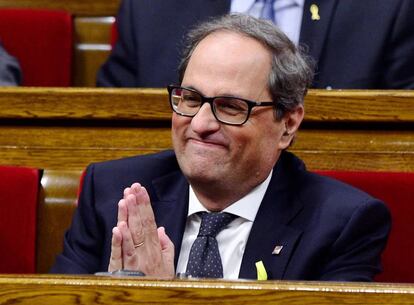Quim Torra is elected new Catalan premier
Considered a radical separatist, the candidate was voted in with 66 votes in favor and 65 against

Catalonia has a new premier after nearly five months of political deadlock. Quim Torra, who was handpicked by ousted leader Carles Puigdemont as his successor, was voted in at the second session of the investiture debate after failing to secure an absolute majority on Saturday.
At the Monday morning debate, Torra sought to dispel accusations that he is a radical separatist who will ignore the needs of unionist Catalans. He insisted that his words are aimed at all 7.5 million Catalans, said that he is extending his hand to everyone, and claimed that “it is possible to find common ground.”
But Torra underscored that he plans to push ahead with the secessionist agenda.
Torra spoke of building a “feminist republic”
“With a republic, everyone will win rights, nobody will lose rights: these are for everyone, no matter which way they vote. The Catalan republic is equality, liberty and fraternity,” said Torra in his speech, paraphrasing the national motto of France. “A Catalan republic means looking towards Europe.”
Torra again suggested that his mentor Carles Puigdemont could play some role despite being formally unable to run for the premiership. He mentioned the Assembly of Elected Officials, an unofficial body created by secessionists ahead of the 2017 referendum with a view to using it as a parallel parliament, in the event that Madrid suspended home rule. The group has never met and has no official headquarters, but separatist forces feel that it could be used to symbolically vote in Puigdemont as president-in-exile.
“We will have three channels for republican political action: in exile; in Catalonia through the Generalitat (government), the parliament, the city councils and the Assembly of Elected Officials; and through action by citizens who are empowered and involved in the constituent process,” said Torra.
The candidate, who presented a governing program filled with promises about a fairer society and economy, admitted to past mistakes. “We have to recognize the lessons that were learned if we want to make progress. Any secessionist will admit that mistakes have been made,” he said. “Dialogue and life. They can always count on us for that.”
Reaction
The main opposition leader, Inés Arrimadas of Ciudadanos, said that she feels “a tremendous sadness, not just because you are reaffirming the actions of the previous government, but because we are going to be led by an individual whose ideology, as reflected in his own articles, defends xenophobia and populism.”
“Electoral laws gave you a (parliamentary) majority that you did not get at the polls,” added Arrimadas, whose party received the largest share of the vote at the December election. The three separatist parties received 47.5% of the votes, the same as in the 2015 elections, but still secured a narrow majority of seats.

Arrimadas said that Torra wants to “replace the parliament with an Assembly of Elected Officials made up exclusively of separatists,” and that he wants to do the same with the government through a Council of the Republic. “You want to eliminate the parliament, the government... just what institutions are you trying to restore, exactly?”
Sergi Sabrià, the speaker for the Catalan Republican Left (ERC), the second-largest separatist force in Catalonia, insisted on the notion of a Catalan republic that is open to everyone.
“We have all built this country together. We are all citizens of Catalonia. The republic is a tool to build a fairer society,” he said. “The hour of victory has arrived; when the republic wins, everyone wins. The prisoners and exiles have led the way, making it possible for us to be here today. We will never give up, we will persist and keep fighting.”
Miquel Iceta, of the Catalan Socialist Party, told Torra that “we want to know whether you are going to respect the existing legal framework.”
“Those who feel only Catalan are as Catalan as those who have other feelings of identity,” said Iceta, whose party supports unity with Spain. “You’ve said here today that you want the latter to have a republic. But what do you think of the Catalans who also feel Spanish? When you look at Catalonia, do you see everyone, or just a part?”
Xavier Domènech, the speaker for the unaligned, leftist Catalunya en Comú-Podem group, told Torra that “Catalans are weary. They want a government. But we dont’ like this government.”
“You have explained a very broad governing program for just five or six months. If this government is going to last five months, you’re not going to carry it through. Not out of breaking your promises, but out of being unable to. Is this government going to last five months?”
A hardliner
Torra, considered a hardline separatist, is known for having made incendiary statements against Spain in the past. On Saturday, he argued in favor of “constructing of a country with the maximum radicalism possible.” He defended a division of powers between those he himself would hold as official premier, and those that would be held by Puigdemont, who is currently in Germany awaiting possible extradition to Spain over his role in last year’s unilateral declaration of independence.
Torra also used the term “transitional” to define the time that Puigdemont and his former colleagues in the regional Cabinet will have to wait until they return to the positions they were ousted from under Article 155, the section of the Spanish Constitution used by Madrid last year to suspend the region’s autonomous powers. For this reason, Torra has been described by the opposition as “Puigdemont’s puppet.”
At the first session, the pro-independence candidate received 66 votes in favor, 65 against and four abstentions from the CUP party. He needed 68 votes to succeed. The votes in favor came from the pro-secession Together for Catalonia party and the Catalan Republican Left (ERC).
English version by Simon Hunter.and Susana Urra.
Who is Quim Torra?
Torra was named the new candidate by ousted Catalan premier Carles Puigdemont. The move could end a months-long deadlock since snap elections called in December by the central government in Madrid saw pro-independence parties win most seats in parliament, but fall short of an absolute majority.
His bid comes after three failed nominations, the last of which lacked support from the CUP party. But unlike previous candidates – Puigdemont, grassroots independence activist Jordi Sànchez and Jordi Turull – Torra is not facing charges for his involvement in the unilateral declaration of independence, or living in self-imposed exile.
Torra is described as a hardline separatist and a staunch opponent of the Spanish government. “They want to mute us, to silence us, they want us to be frightened and afraid. They even want us in prison and in exile,” he recently said in parliament. “I have always been an emotional separatist.”
Trained as a lawyer, Torra has been in politics for 10 years. He is the author of seven books, many about Catalan journalists and intellectuals in the 1920s and 1930s, and he was an editor for the Catalan publishing house A Contra Vent.
His activism led him to a spot on the advisory council of the civic association Catalan National Assembly (ANC) in 2011, and he quickly climbed rungs, landing appointments as the head of Barcelona Born Cultural Center and the president of Òmnium Cultural, the Catalan independence association behind the controversial "Help Catalonia. Save Europe" video.
On Twitter, Torra is equally vehement, writing polemical messages such as: “Evidently we have been living under Spanish occupation since 1714;” “Spaniards only know how to plunder;” and: “Shame is a word the Spaniards long ago deleted from their vocabulary.” Many of his messages were recently deleted but screenshots remain.
Other controversial tweets include: “It was a joke. Gentlemen, if we continue here for more years we run the risk of going crazy like the Spanish,” “The Spanish in Catalonia are like energy: they don’t disappear, they transform;” “Above all, what is surprising is the tone, poor education, Spanish snobbery, sense of filth. Horrible.”
Tu suscripción se está usando en otro dispositivo
¿Quieres añadir otro usuario a tu suscripción?
Si continúas leyendo en este dispositivo, no se podrá leer en el otro.
FlechaTu suscripción se está usando en otro dispositivo y solo puedes acceder a EL PAÍS desde un dispositivo a la vez.
Si quieres compartir tu cuenta, cambia tu suscripción a la modalidad Premium, así podrás añadir otro usuario. Cada uno accederá con su propia cuenta de email, lo que os permitirá personalizar vuestra experiencia en EL PAÍS.
¿Tienes una suscripción de empresa? Accede aquí para contratar más cuentas.
En el caso de no saber quién está usando tu cuenta, te recomendamos cambiar tu contraseña aquí.
Si decides continuar compartiendo tu cuenta, este mensaje se mostrará en tu dispositivo y en el de la otra persona que está usando tu cuenta de forma indefinida, afectando a tu experiencia de lectura. Puedes consultar aquí los términos y condiciones de la suscripción digital.








































